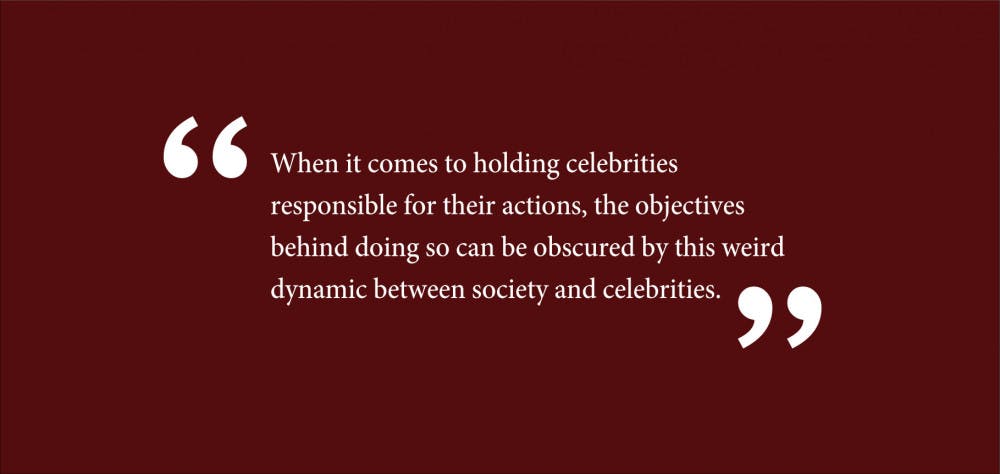On a foundational level, we all have an understanding of right and wrong and are able to identify these behaviors in others. This rings particularly true when it comes to celebrities or public figures. Though it’s often hard to believe, they’re people just like us — the major difference being that they’re constantly in the spotlight and under our watchful eyes as a society. These people are more like us than we sometimes remember; they are humans, prone to making mistakes, which conflicts with our idealized perception of them. And so it follows that we go about holding these people accountable for their actions. My previous column went in-depth into the phenomena of “cancelling” as a form of penance for celebrity transgression, and called for more imagination in how we proceed in public moments that are incongruent with social justice ideals. I want to extend this analysis: while holding celebrities accountable is important, fixating on individuals with considerable influence and impact can distract us from similar forms of harm present in our more immediate surroundings.
There’s something to be said about fame and celebrities as a whole. There’s an interesting dynamic at play where we, as consumers, have a certain amount of control over who bombards our newsfeeds and airwaves. Our interest largely determines the relevance of celebrities. In this algorithmic age, our demands from the famous have increased; surely, we think, our unending attention necessitates some form of reciprocal obligation in this parasocial relationship. As was already stated, celebrities are people just like us, and far too often we see what happens to them when this demand for more and more access becomes too much to handle.
We now return to the conversation around accountability. When it comes to holding celebrities responsible for their actions, the objectives behind doing so can be obscured by this weird dynamic between society and celebrities. Because celebrity narratives inherently become our own, legislating true accountability loses its gravity; the motivation behind naming harm done by a celebrity can be as weak as wanting to seem “woke” in front of peers. We determine whether or not a celebrity stays relevant, we can call for the “cancelling” of anybody, we can administer mob justice within minutes — what on the surface might seem like a tool for social justice is really just a demonstration of power.
An important element to add to this discussion is the site, pun intended, where most of these conversations take place: online. As people of the 21st century, it makes sense that social media and technology intersect with our existence in ways that have never occurred before. Unfortunately, the fight for social justice that occurs online can sometimes fail to break through computer and iPhone screens and manifest itself in proportional ways. Our virtual obsession with celebrities — the idols in these online proxy wars — imbues them with outsized power; distributing Online Celebrity Justice becomes wrongfully equated with achieving societal change. For example, the #MuteRKelly movement transformed an issue of national importance into a conversation around a single celebrity. The movement erupted on social media following the revelations of R. Kelly’s insidious and sustained campaign of sexual predation and assault. So if R. Kelly were to be arrested and put in jail, many people would say “job well done.” And this would be a warranted response given the harm the singer has caused, but it’s also necessary to think beyond bringing one individual to justice. As is stipulated on the movement’s website, #MuteRKelly isn’t just about the singer, it’s about black women. When we zoom out to consider macro-level trends — such as the fact that 60 percent of black women are sexually abused as children — shifting the focus away from R. Kelly seems appropriate. While the hashtag is not just a “flash in the pan” moment with temporary goals — it’s calling for a cultural break — many who interact with the social media campaign run the risk of displacing justice for a group onto a single person. While Kelly’s visibility means the implications of his individual fate are disproportionately large, achieving justice for all survivors of sexual assault still requires an entire movement behind it.
Social media, on its own, is not likely to bring about the social change we seek. Seventy-one percent of Americans agree that social media activism can make people feel as if they’re having a larger impact than is truly the case . But such feelings of accomplishment in spite of contrary evidence are not limited to the realm of social media activism. Thinking back to the election of President Obama, many thought America entered into an era of post-racialism. However, more than 60 percent of Americans believe racism is still a major problem. This is to say that neither social media activism nor a more traditional way of enacting change — voting — is infallible. So, I think it’s useful to think outside of the box of social media and consider ways in which 21st century notions of justice can be actualized through means of the past. This could mean opting to volunteer at a local organization that does work around sexual assault prevention in addition to disseminating information on Twitter. In doing this, we can point out the harmfulness of people like R. Kelly, while also producing a more tangible effect when it comes to creating a culture that supports survivors. We must find a way to mediate our reflexive pull toward social media and try to engage in meaningful modes of activism to bring about a more enduring social justice.
Quentin Thomas ’21 can be reached at quentin_thomas@brown.edu. Please send responses to this opinion to letters@browndailyherald.com and op-eds to opinions@browndailyherald.com.





